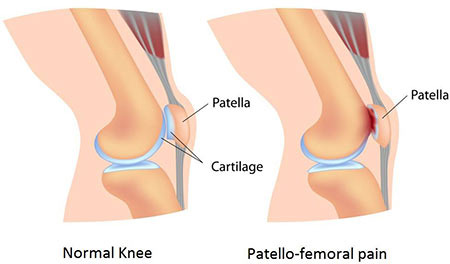 Midtown Manhattan
36 W 44th St Ste 1416 New York, NY 10036
Midtown Manhattan
36 W 44th St Ste 1416 New York, NY 10036
- (212) 621-7746
- text us
- BOOK ONLINE Call for Same Day Appointments
 Midtown Manhattan
36 W 44th St Ste 1416 New York, NY 10036
Midtown Manhattan
36 W 44th St Ste 1416 New York, NY 10036
The patella tendon is at risk for a patella tendon tear, patella tendon pain, and subsequent patella tendonitis treatment, especially if you’re a runner in NYC or play any sport that taxes your knees. Our doctor can provide you with effective treatment for patella tendonitis that includes instructions on how to stay healthy while you pursue your physical activities. Come to our sports injury clinic to get your patellofemoral pain evaluation and treatment. Meet our pain doctor Febin Melepura M.D. to get the pain relief you need in the safe, reassuring hands of the best specialists in NYC.
 Also known as runner’s knee, patellofemoral pain syndrome refers to any pain originating in the front of your knee. This knee pain frequently occurs in teenagers, manual laborers, and athletes. The patella is the small bone located in front of each knee joint where your femur, or thighbone, and your tibia, or shin, meet. The patella protects your knee and connects the muscles in the front of the thigh to your shinbone.
Also known as runner’s knee, patellofemoral pain syndrome refers to any pain originating in the front of your knee. This knee pain frequently occurs in teenagers, manual laborers, and athletes. The patella is the small bone located in front of each knee joint where your femur, or thighbone, and your tibia, or shin, meet. The patella protects your knee and connects the muscles in the front of the thigh to your shinbone.
The patella tendon may weaken or be compromised, which may then allow some unnatural movement of the patella. This leads to the patella rubbing against your femur, creating pain at the point of contact. Untreated, the pain can lead to chronic conditions such as patellofemoral pain syndrome and patella tendonitis. Talk to your sports medicine doctor if you suspect a patella injury or wear-and-tear symptoms.
Your symptoms may be mild and irritating to severe and debilitating. Some people have reported a combination of symptoms. Yours may include:
Risk factors for having a patella tendon tear include :
Patella tendon pain often occurs after consistent and continuous repetitive activity of some kind. External factors or internal conditions also may predispose the patella to injury. These factors cover a range of conditions, such as:
I am extremely pleased with the service that I received from Dr. Melepura and his staff. I highly recommend him to anyone that has been experiencing pain.
Paris WayYour NYC sports and pain medicine doctor understands the frustration and limitations that occur with patellar tendon pain.
Since you need your knees to get around every day, your doctor also checks your range of motion before suggesting any patella tendonitis treatment. You may need to have some imaging tests — such as x-rays, computed tomography (CT scans), or magnetic resonance imaging (MRIs) — to see any malformations in the bones, tendons, ligaments, and muscles.
The goal of patella tendonitis treatment is to reduce symptoms, identify the cause and strengthen or retrain your muscles. All of these get you back on the road to pain-free mobility with the hope of preventing future injuries. Other patella tendonitis treatments your doctor may suggest include:
Rarely, arthroscopic surgery may be an option to release tightened muscles or to realign your patella. Your doctor only recommends an invasive procedure after no other treatments have succeeded in solving your pain.
Minor pain involving the patella tendon may resolve on its own within a few weeks to a few months. Surgery recovery time, however, can take between three and six months. Aftercare includes the prevention of further injury by maintaining the strength of your supporting muscles, losing weight, and doing proper stretching. Get the best treatment for patella tendonitis to prevent further patella tendon pain.
Do you have any questions about patellofemoral pain syndrome treatment in NYC? Would you like to schedule an appointment with the best-rated New York patellofemoral doctor Febin Melepura MD of the sports pain management clinic? Please contact our office for a consultation.

Febin Melepura, MD is a top rated, best in class interventional pain management doctor. He is a nationally recognized pain relief specialist and is among the top pain care doctors in New York City and the country. He is an award winning expert and contributor to a prominent media outlets.
Dr. Febin Melepura has been recognized for his thoughtful, thorough, modern approach to treating chronic pain and, among other accolades, has been named a “top pain management doctor in New York”, and one of “America’s Top Doctors™” for an advanced sports injury treatments.